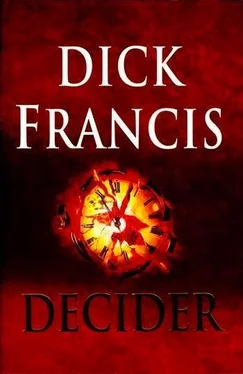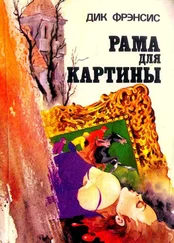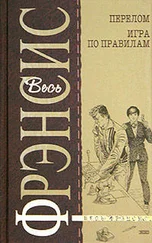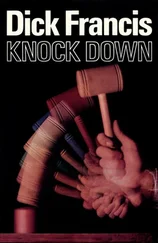During the ensuing pause while the bad news got chewed and digested, a tall fair-headed boy came out of one of the bedrooms on the gallery, skipped down the stairs, waved me a flapping hand and went into the kitchen, to reappear almost at once carrying the baby, now clothed. The boy took the baby upstairs, returned with him to his bedroom and shut the door. Silence fell.
Questions hovered on Roger’s face but remained unasked, to my amusement. Roger — Lt. Colonel R.B. Gardner, according to the Stratton Park racecards — would have been a thorough flop as a journalist, but I found his inhibitions restful.
‘You were our last hope,’ Oliver Wells complained, accusingly.
If he hoped to instil guilt, he failed. ‘What would you expect me to do ?’ I asked reasonably.
‘We hoped...’ Roger began. His voice faded away, then he rallied and manfully tried again. ‘We hoped , do you see, that you might knock some sense into them.’
‘How?’
‘Well, for one thing, you’re big.’
‘Big?’ I stared at him. ‘Are you suggesting I literally knock some sense into them?’
It did seem that my appearance had given them instant ideas. It was true that I was tall and physically strong; very useful for building houses. I couldn’t swear I’d never found those facts conclusive in swinging an argument. But there were times when to tread softly and shrink one’s shoulder-span produced more harmonious results, and I leaned by nature more to the latter course. Lethargic, my wife called me. Too lazy to fight. Too placid. But the ruins got restored and left no trails of rancor in local official minds, and I’d learned how to get round most planning officers with conciliation and reason.
‘I’m not your man,’ I said.
Roger clutched at straws. ‘But you do own those shares. Can’t you stop the war with those?’
‘Is that,’ I asked, ‘what you mainly had in mind when you sought me out?’
Roger nodded unhappily. ‘We don’t know where else to turn, do you see?’
‘So you thought I might gallop into the arena waving my bits of paper and crying “enough”, and they would all throw down their prejudices and make peace?’
‘It might help,’ Roger said, straightfaced.
He made me smile. ‘For one thing,’ I said, ‘I own very few shares. They were given to my mother all those years ago as a divorce settlement, and I inherited them when she died. They pay a very small dividend now and then, that’s all.’
Roger’s expression went from bewilderment to shock. ‘Do you mean,’ he demanded, ‘that you haven’t heard what they are fighting about? ’
‘I told you, I have had no contact with them.’ All I knew was what I’d learned from a brief paragraph in The Times ’s business pages (‘Stratton heirs dispute over family racecourse’) and some blunter remarks in a tabloid (‘Long knives out at Stratton Park’).
‘I’m afraid you will soon hear from them,’ Roger said. ‘One faction of them want to sell off the racecourse to developers. As you know, the course lies just to the north-east of Swindon, in an area that’s growing all the time. That town has exploded into a centre of industry. All sorts of firms are moving there. It’s heaving with new life. The racecourse land is increasing in value all the time. Your few shares might now be worth quite a lot, and they might be worth even more in the future. So some of the Strattons want to sell now, and some want to wait, and some don’t want to sell at all, but to go on running the racecourse for racing, and the sell-now lot should have been onto you by now, I would have thought. Anyway, some day soon they’ll remember your shares and they’ll drag you into the fight whether you like it or not.’
He stopped, feeling he’d made his point; and I supposed he had. My sincere desire not to be dragged into any fracas looked like being a casualty of ‘the real world’, as one of my sons described all calamities.
‘And naturally,’ I commented, ‘you are with the faction that wants racing to continue.’
‘Well, yes,’ Roger admitted. ‘Yes, we are. Frankly, we hoped to persuade you to vote your shares against selling.’
‘I don’t know that my shares even have a vote and there aren’t enough of them to sway anything. And how did you know I had any?’
Roger briefly consulted his fingernails and decided on frankness.
‘The racecourse is a private limited company, as I expect you know. It has directors and board meetings and the shareholders are informed each year when the annual general meeting is to take place.’
I nodded resignedly. The notice came every year and every year I ignored it.
‘So last year the secretary who sends out the notice was ill, and Lord Stratton told me just to do it, there’s a good chap...’ — his voice mimicked the old man’s splendidly — ‘so I sent out the notice and it happened that I put the list of names and addresses in a file for the future...’ he paused, hovering, ‘in case I had to do it again, do you see?’
‘And the future’s upon us,’ I said. I pondered. ‘Who else owns shares? Did you by any chance bring the list with you?’
I saw from his face both that he had brought it and also that he was unsure of the ethics of passing it over. The threat to his job, though, conquered all, and after the briefest of hesitations he reached into an inner pocket in the tweed jacket and produced a clean once-folded sheet of paper. A fresh copy, by the looks of things.
I opened it and read the ultra-short list. Shorn of addresses it read:
William Darlington Stratton (3rd Baron)
Hon Mrs Marjorie Binsham
Mrs Perdita Faulds
Lee Morris Esq
‘Is that all?’ I enquired blankly.
Roger nodded.
Marjorie Binsham was, I knew, the old lord’s sister. ‘Who is Mrs Perdita Faulds?’ I asked.
‘I don’t know,’ Roger said.
‘So you haven’t been to see her? You came here, though?’
Roger didn’t answer, but he didn’t need to. That sort of ex-soldier felt more at home with other men than with women.
‘And,’ I said, ‘who inherits the old man’s shares?’
‘I don’t know ,’ Roger answered exasperatedly. ‘The family aren’t saying. They’ve shut up like clams about the will, and of course it’s not open to public inspection before probate, which may be years away, at the rate they’re going. If I had to guess, I’d say Lord Stratton left them all equal shares. He was fair, in his way. Equal shares would mean that no single one of them has control, and that’s the nub of the problem, I’d think.’
‘Do you know them personally?’ I asked, and they both nodded gloomily. ‘Like that, is it?’ I asked. ‘Well, I’m sorry, but they’ll have to sort it out themselves.’
The young fair-haired woman strolled out of the kitchen with a glass in one hand and a feeding bottle of milk in the other. She nodded vaguely in our direction and went up the staircase and into the room where the boy had taken the baby. My visitors watched in silence.
A brown-haired boy rode a bicycle up the passage from the front door and made a controlled circuit of the room, slowing slightly as he passed behind me and saying, ‘Yeah, yeah, you told me not to,’ before returning along the passage towards the outside world. The bicycle was scarlet, the clothes purple and pink and fluorescent green. The very air seemed to quiver with vibrant colour, settling back to quiet slate when he’d gone.
Tactfully, no one said anything about obedience or keeping children in order.
I offered the visitors a drink but they had nothing to celebrate and murmured about the length of the drive home. I went with them into the softening sunlight and proffered polite apologies for their non-success. They nodded unhappily. I walked across with them to their car.
Читать дальше




